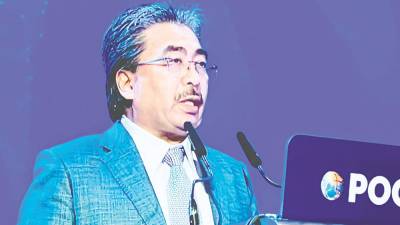Rising medical costs, digital transformation to define Malaysian insurance landscape this year ()


<img src="https://thesun.my/binrepository/400x266/0c20/400d225/none/11808/UAJG/sun-life-raymond-lew-z_5181058_20250504180331.jpg"><p><b>KUALA LUMPUR: </b>The domestic insurance industry is expected to face several key trends this year that will significantly impact the landscape, with rising medical costs being a major concern. </p><p>The escalating expenses may lead to higher claims and subsequent premium adjustments, pushing insurers to develop more innovative products that address the root causes of these cost increases.</p><p>Meanwhile, digital transformation will continue to accelerate. The licensing of digital insurance and takaful operators is expected to significantly improve market access and close protection gaps.</p><p>At the same time, generative artificial intelligence (AI) is increasingly playing a vital role in the industry, especially in the area of enhancing fraud detection, enabling hyperpersonalised services, and streamlining operations through automation. </p><p>Furthermore, predictive analytics will allow insurers to anticipate customer needs, while AI-driven efficiency will reduce costs and improve service speed. </p><p>Sun Life Malaysia president and country head Raymond Lew said the industry is also witnessing more strategic cross-industry collaborations, which are increasingly vital for insurers. </p><p>“Partnerships with healthcare, technology and financial services sectors enable the development of integrated solutions that cater to diverse client needs. Examples include comprehensive health programs, advanced digital platforms, and bundled financial products. </p><p>“By delivering seamless, holistic experiences, insurers can significantly enhance client satisfaction, foster long-term loyalty, and improve retention,“ he told <i>SunBiz</i>.</p><p>Liew said domestic and global economic uncertainties are driving a strong focus on financial inclusion. </p><p>He said the industry is actively working to expand insurance and takaful penetration, particularly among underserved communities, to ensure greater financial resilience in the face of these uncertainties.</p><p>For 2024, Liew said the Malaysian insurance industry remained resilient, despite rising costs and premium concerns, with investment-linked products leading the market. This lined up with Malaysia’s positive economic growth, which grew from 3.6% in 2023 to 5.1% in 2024. </p><p>The growth in consumer spending and favourable digital and regulatory reforms, including the comprehensive Policy Document on Licensing and Regulatory Framework for Digital Insurers and Takaful Operators also supported the industry’s favourable performance, he added.</p><p>Liew said inflation and rising living costs are significantly impacting financial resilience in Malaysia. </p><p>He stated that many people prioritise meeting their basic needs, which leaves little space for future savings. </p><p>“Escalating costs, from food to medical bills, are creating financial strain,“ Liew noted.</p><p>He pointed out that Sun Life’s Asia Financial Resilience Index 2024 revealed that only 38% of Malaysians have a</p><p>financial plan beyond one year ahead. </p><p>Furthermore, the respondents listed retirement and savings as their second-highest financial priority, but only 18% currently have a retirement or pension plan to support their goals.</p><p>“We recognise the challenges posed by inflation and rising living costs. </p><p>“Sun Life is addressing these concerns through increased emphasis on financial literacy programmes, making retirement planning tools more accessible, and developing products that help Malaysians build financial resilience in the face of these economic pressures,“ Liew said.</p><p>Sun Life’s priority remains empowering Malaysians to secure their financial future through better awareness and accessibility to insurance and takaful solutions, he said.</p><p>“Legacy planning will be a major focus in 2025, as we continue to bridge knowledge gaps in this crucial area. Our recent insurance literacy survey indicated that 65% of respondents acknowledged the important role of legacy</p><p>However, only 15% of respondents have a plan in place.</p><p>“A key initiative driving this agenda is our partnership with Alif Satar as Sun Life Malaysia’s 2025 ambassador. </p><p>“Through initiatives like bite-sized education series, Alif will help deepen public understanding of how takaful supports long-term financial security and family stability,“ Liew said.</p><p>Beyond education, Sun Life is also focused on growing its agency and bancassurance channels in tandem, providing customised solutions to meet their evolving needs. Such coverage includes legacy solutions for high-net-worth clients, comprehensive family critical illness protection for middle-to-lower-income families, and simple term plans sold online to protect a wider audience.</p><p>Liew said, “We are committed to exploring all avenues to boost our business growth and capabilities. Being a digitally driven enterprise, we are actively intensifying our digital efforts, including investing in technology, digital tools, and analytics to transform operational efficiency. </p><p>“We aim to use technology to help our advisers deliver the best possible advice and experiences to our clients.</p><p>“For example, we have partnered with Munich Re Automation Solutions, adopting their SaaS underwriting platform, Allfinanz Spark, to streamline and automate the underwriting processes. This enables us to provide quicker, better service and more personalised assessments to clients.”<br />Globally, Liew said, Sun Life is embracing the generative AI trend with Amazon’s AWS. </p><p>“Our ‘Sun Life Asks’ chatbot is a game-changer. It is answering over 10,000 queries a week and saving our team</p><p>significant time. In short, by leveraging AWS and generative AI, we are able to scale our operations, reduce costs, and innovate rapidly, ensuring we stay ahead in the competitive insurance landscape,“ he said.</p>





